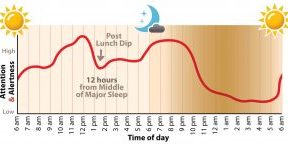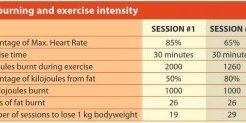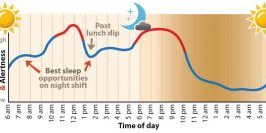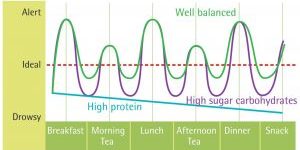Managing mental health and fatigue
Sleep debt
Sleep debt is the cumulative effect of not getting enough sleep. Two kinds of sleep debt have been proposed: 1) partial sleep deprivation; or 2) total sleep deprivation. Partial sleep deprivation occurs when a person gets inadequate sleep for many days or weeks. Total sleep deprivation occurs when a person is kept awake for days……
When will fatigue occur?
The time of day affects fatigue, due mainly to the body’s circadian rhythms. Circadian rhythms are natural body rhythms that are driven by the cycle of day and night. The start of the cycle is typically linked to the rising of the sun, and the person getting out of bed after a night’s sleep. During……
How hard do I need to exercise to burn fat?
This is probably one of the most common questions people ask about exercise and weight loss; and the most poorly understood. The answer to this question comes down to the intensity and time you spend exercising. We burn two fuels simultaneously, carbohydrate and fat. However, the proportion of each that we burn varies depending on……
What causes fatigue?
Fatigue is caused by a range of different factors. It is usually not just one factor but a combination of factors that will explain someone’s fatigue. Being able to characterise the symptoms will enable you to identify the underlying cause/s of your fatigue and take action to increase your fatigue resistance. The Fatigue Cause Model……
When should I sleep?
Our levels of alertness and attention are influenced by our circadian rhythms, as shown in the figure below. Circadian rhythms allow us to feel more alert during the day and less alert during the evening. This is the primary reason it is difficult to stay awake at night and why we may struggle to sleep……
Sleep medication
Sleeping medication may be helpful to overcome short term needs or significant life events, such as grief or high stress events. Sleeping medication can be used to improve sleep quantity and quality but should only be used for short periods to avoid dependency, as dependency will only lead to longer term sleep problems. It is……
I don’t have enough time to exercise?
I am too busy at work and my work hours are too long. Despite advances in technology, many of us still spend more – rather than less – time at work. However, there are ways in which you can be more active: Go for a walk in your lunch break – your afternoons will be……
Mood and sleep
It’s no surprise that sleep, or a lack of sleep, affects our mood. One sleepless night will cause most people to be more irritable, short-tempered and stressed. After a good night’s sleep, your mood often returns to normal. Whilst sleep does affect mood, mood also affects sleep. People suffering anxiety or stress will experience agitation,……
Managing mental health with your lifestyle
A healthy lifestyle is paramount for the treatment and prevention of mood disorders. Healthy lifestyle includes a combination of healthy eating, regular exercise and reduced alcohol consumption. Lifestyle changes help to relieve the symptoms and may even prevent mood disorders. Exercise The therapeutic benefits of exercise include boosting confidence and self-esteem, relieving muscular tension, promoting……
Meal type and fatigue
It is often promoted that foods high in carbohydrate make you drowsy because they increase the uptake of the amino acid tryptophan by the brain. Tryptophan is a chemical that can work together with another important brain chemical called serotonin, to help promote a calming effect and sleepiness. Foods rich in protein, however, increase production……










